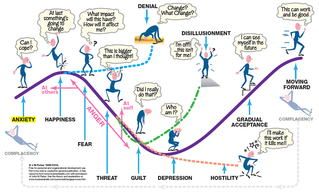Coping with Change and Trauma

We have such an interesting relationship with change and stability as a species, never being able to quite stay with one for long: If things get too stable, we want to shake it up, and if things are too shaky, we yearn for some predictability.
Some of us are more inclined to want change and be excited about the possibilities change brings up, while others are highly resistant to change.
Even with change that we long for and seek ourselves, there is a fair degree of emotional turmoil, especially if others that the change affects aren't in the same page or don't share the same vision as us.
To cope with change that is forced upon us, especially in traumatic ways, will clearly be harder.
Some of us are more inclined to want change and be excited about the possibilities change brings up, while others are highly resistant to change.
Even with change that we long for and seek ourselves, there is a fair degree of emotional turmoil, especially if others that the change affects aren't in the same page or don't share the same vision as us.
To cope with change that is forced upon us, especially in traumatic ways, will clearly be harder.
Understanding resistance to changeWe resist change when we see a threat in that change to our safety, security or any other aspect that we value. The threat may not be real, and yet the perceived threat can overwhelm and make us resistant to a possibly beneficial change.
The resistance to change might come from many aspects. Perhaps there is a comfort in the way things are, a disbelief that anything better is available. Perhaps there is doubt because the changed scenario isn't clear, or is unattractive, or the path to it looks too risky, or there is doubt of one's abilities to get there or in the people associated with the change. It could even be feelings of loss of power or prestige through this transition. Recognizing what is making us resistant to a proposed change can help us get with the program and add our will to it. This will or intent to change needs to come from within, no matter the coercion or how severely degraded the current environment might be. After all, you can take the horse to the pond, but you can't really make it drink the water - sometimes no matter how much you coerce it. |
Image:: John Fisher's Transition Curve
Change occurs when there is an intent to change matched with the ability to change. Why resist change we want?Change we are initiating for ourselves can be hard to implement and sustain. Getting into a new fitness regimen, for instance, or quitting smoking.
Change causes stress simply because what we don't know scares us, even if it is for the better. There is a part of us that tells us we might fail, we might have wasted time. The familiarity of what is and how we have coped with it is a powerful incentive for inertia. The will and intent to change needs to be really powerful to get over that initial resistance. |
Coping with traumatic change
Sometimes, we go through experiences or our environment is changed by powerful forces so suddenly and maybe even violently, in emotionally painful and distressing ways, and where our ability to cope and have a sense of our own power and agency are severely threatened. These could be natural disasters (Earthquakes, floods etc.), social events (riots, wars, mob violence etc.), changes to life situations (being fired, arrested, divorced, etc.) or personal violence (sexual assault, being mugged, beaten up etc.) or other events that make one fear for one's safety, life and question the security and ability to care for oneself. These could be one-time events, or even repetitive. Often, simply being observers to such events can be very painful.
Trauma is the emotional response to such climactic events.
The impact of traumatic events can start with numbness and shock to begin with, and a host of other emotional responses such as anger, rage, sadness, guilt, helplessness, relief etc. might also present themselves, often in confusing sequences, and without apparent triggers in the immediate environment. Adjusting to life post the traumatic incident and adapting to the changes in oneself and the environment can be hard
Sometimes, the impact of trauma can last for a really long time and be seen in behavioural challenges well into adulthood
Trauma is the emotional response to such climactic events.
The impact of traumatic events can start with numbness and shock to begin with, and a host of other emotional responses such as anger, rage, sadness, guilt, helplessness, relief etc. might also present themselves, often in confusing sequences, and without apparent triggers in the immediate environment. Adjusting to life post the traumatic incident and adapting to the changes in oneself and the environment can be hard
Sometimes, the impact of trauma can last for a really long time and be seen in behavioural challenges well into adulthood
Post-Traumatic StressAny traumatic event, whether one was witness to it, part of it or a survivor of it, can temporarily challenges one's abilities and be upsetting.
However, if the memories of the trauma continue to stress, debilitate and decrease ability to function, through continued re-experiencing of the trauma, a desire to avoid engagement and a persistent anxious state, it might be post-traumatic stress. People who have been through repeated traumas, and people whose coping skills were already compromised or never challenged much (such as children) could especially be more vulnerable. For some, continued post-traumatic stress can lead to other unhelpful behaviours such as increased substance use, isolation etc. that might give an illusion of temporary relief but might harm more than it helps. Recovery from post-traumatic stress is really about giving yourself real relaxation, real connection to people and getting back to a sense of purpose and joy. Working through post-traumatic stress can call for specialist help, and techniques like EMDR and working with your body can help, in addition to cognitive-behavioural therapy. |
Post-Traumatic GrowthWhile post-traumatic stress is a reality, the other side of it, where there is a radical and positive new growth stemming from the traumatic experience is also a reality. It is not simply a story of that which doesn't kill you making you stronger, or putting a silver-lining on a dark cloud.
Post-traumatic growth is the positive impact and often re-imagining of one's life post a traumatic event that changes lives, often powerfully and permanently. This positive change could be in broader connections to humanity, a deeper spirituality, greater accomplishments, newer life goals, and changed personal relationships - often along side or stemming from deep distress. Many of our heroes today, starting from Mahatma Gandhi to Christopher Reeve, have such stories to offer. Speaking more broadly, if we look into our own lives, there will probably be times we did recover from tragedies in a stronger, more meaningful way. So, what really makes the difference? How is it that some people are able to use their traumas to transform their lives? Can there be a learning from their lives to apply more broadly? Could compassion and love be answers? |
How can you help yourself?
|
If you are resisting change, either what you are choosing for yourself or what is happening to you, the following might help:
|
|
If you have gone through a traumatic experience and are struggling to cope, the following might help you:
- Try and take as much time as you can to heal. Tell yourself you have been through a lot, and that you will need to grieve and get better. Keep yourself as relaxed as you can, avoiding any new stresses. Rest and sleep a lot.
- Allow yourself to feel what you feel, and try to find ways to express and share safely, including in groups. Some of the bodily responses to trauma could be nervous shaking/ shivering etc., and working with your body and allowing for some physical release can help as well.
- Find yourself company. Look for others who are going through or have gone through similar experiences. Talk to trusted friends, family or others - even if they have not experienced what you are going through. Stay connected.
- Keep yourself grounded in what you can control and influence. This includes as much of a daily work-life routine as you can, physical activity that you can do, small tasks that you can accomplish. Create small rituals for yourself that can allow you to breathe deeply and feel connected to the world around you in a positive manner. Meditation and visualizing exercises can help.
- Get involved in activities that can help you feel your usefulness and your power. It could be volunteering for others in similar situations, or even simple activities like gardening or sketching.
When do you seek help? |
If you have been through a traumatic event, and are finding it hard to recover even after six weeks or so, or struggle to function as well as you would like, please seek help. If you have suicidal thoughts, please call for help right away.
In other scenarios, if you are finding yourself stuck, or finding yourself backsliding and want to help yourself through to the goal you want, or if you are finding that there are events happening and you are being called upon to adapt, and you are stressing out, please call for help. More information |
|
1. HelpGuide on Traumatic stress and recovering from them
2. Post-traumatic growth research from UNC, Charlotte. 3. Sidran on psychological trauma 4. Pyschology Today on 10 rules of change 5. WhiteSwan Foundation on PTSD |

